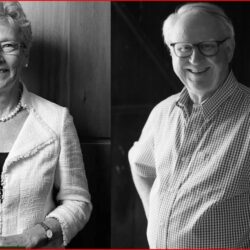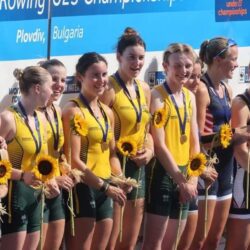ABC Arts – By Hannah Story and Anna Freeland
Sydney-based artist Laura Jones [H.4a.4b.2c.1d/E.6.5a.4b.2c.1d.1e] has won the $100,000 Archibald Prize for her portrait of author and conservationist Tim Winton, becoming only the 12th woman to win the prize in its 103-year history.
She joins other woman winners including last year’s winner Julia Gutman; the first woman and youngest-ever winner Nora Heysen (1938); and Del Kathryn Barton, who has won the prize twice (2008; 2013).
Accepting the award at the ceremony at the Art Gallery of NSW (AGNSW), Jones said: “I hope this win encourages more young girls to pursue a career in the art world.”
This is Jones’s fourth time as an Archibald finalist, having previously painted actor Claudia Karvan (2023); journalist Brooke Boney (2022); and playwright Nakkiah Lui (2019). She was also a finalist in this year’s Sulman Prize, for her self-portrait titled Sliding doors.
Jones was chosen by unanimous decision of AGNSW’s Board of Trustees, including fellow artists Tony Albert and Caroline Rothwell.
She bested 56 other finalists, selected from 1,005 entries, including portraits of activist Julian Assange and Saltburn activist Julian Assange and Saltburn actor Jacob Elordi.
Jones’s win follows last week’s announcement of the 2024 Packing Room Prize, which was awarded to Melbourne street artist Matt Adnate for his portrait of musician Baker Boy.
In her speech, Jones described winning the Archibald as an “incredible thrill”: “I’m shocked, so happy and humbled.”
Art about the environment
Jones grew up in Kurrajong in the Blue Mountains, west of Sydney, and studied Winton’s 1991 Miles Franklin-winning novel Cloudstreet in high school.
With a long-time interest in the relationship between humans and the environment, Jones met the much-loved author at an environmental advocacy event in 2017, the year after she undertook an artist’s residency near the Great Barrier Reef, to study the impact of coral bleaching. The residency became the basis for her 2017 exhibition Bleached at Olsen Gallery in Sydney.
The artist watched the Winton’s ABC TV documentary Ningaloo Nyinggulu, about the fight to save Western Australia’s Ningaloo Reef, when it was released last year. The documentary, as well as a speech he made urging artists to challenge government inaction on climate change, inspired her to paint Winton’s portrait.
She soon discovered that a portrait of Winton had never been a finalist in the Archibald Prize.
“Then I found out why – he was a reluctant subject,’ wrote Jones in her artist’s submission.
‘When I flew to Perth for a sitting, the Great Barrier Reef was suffering its fifth mass bleaching event in eight years. Tim was warm and witty. We spoke about the historical relationship between printmaking and political activism.”
Jones approached the oil painting like a monotype — where an artist applies paint onto a plate that is pressed against paper to make only one print — using thin brushstrokes. In her submission, she explained: “[I let] the paint bleed across the canvas like ink into paper.”
Winton is an outspoken activist for marine conservation. At part of his Perth Festival closing address in 2022, he called out the arts industry for accepting sponsorship from fossil fuel companies.
Speaking to the ABC afterwards, he said: “Let’s face it — banks, super groups, investor groups, they’re all divesting of fossil fuels. Why should the arts industry, in particular, and why should community organisations be less imaginative and less morally aware than bankers?”



